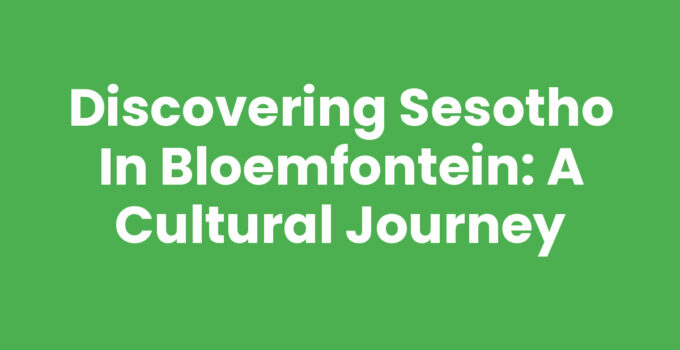Located in the heart of South Africa, Bloemfontein is not only known for its historical significance but also for its rich cultural diversity, which includes the vibrant language and culture of Sesotho. As one of the country’s official languages, Sesotho plays a crucial role in the identity and heritage of many residents in Bloemfontein. In this article, we will delve into the linguistic features, historical background, and the importance of Sesotho in this charming city.
Understanding Sesotho in Bloemfontein: A Detailed Guide
Sesotho, also known as Southern Sotho, is a Bantu language primarily spoken in Lesotho and South Africa. In Bloemfontein, it serves as a means of communication for a significant portion of the population, embedding itself into the everyday life of its speakers. Here’s a step-by-step guide to understanding the essence of Sesotho in Bloemfontein.
1. Historical Background
The roots of the Sesotho language trace back to the Bantu migrations, which significantly shaped the cultural landscape of Southern Africa. In Bloemfontein, the language emerged as a critical mode of communication among the Basotho people, who have enriched the city with their traditions and customs. Understanding this historical context is vital for appreciating the language’s place in contemporary Bloemfontein.
2. Linguistic Features of Sesotho
Sesotho is characterized by its tonal nature and complex grammar. Key linguistic features include:
- Prefixes and Suffixes: Like many Bantu languages, Sesotho employs a system of prefixes and suffixes that can change the meaning of words significantly.
- Tones: The tone in Sesotho can alter meaning, making pronunciation essential for effective communication.
- Pronouns and Verbs: Sesotho has a distinctive structure in its verbs and pronouns, which can be a challenge for new learners but adds to the richness of the language.
3. Everyday Usage of Sesotho in Bloemfontein
Residents of Bloemfontein use Sesotho in various settings—from casual conversations to formal announcements and educational institutions. Street signs, local news broadcasts, and community events often feature the language prominently. Learning common phrases can enhance your communication and cultural integration in the city. Here are a few essential phrases:
- Lumela: Hello
- Dumela mma: Hello, ma’am
- O kae?: How are you?
Recommended Guide: Top Florists in Bloemfontein: Your Ultimate Guide to Blooms
The Importance of Sesotho in Contemporary Bloemfontein
Sesotho’s role extends beyond mere communication; it’s a cornerstone of identity for many Bloemfontein residents. Here’s how:
1. Cultural Identity
Language is a major part of cultural identity, and for the Basotho people in Bloemfontein, Sesotho is a symbol of their heritage. Festivals, traditional celebrations, and daily interactions are often conducted in Sesotho, reinforcing community bonds and cultural continuity.
2. Education and Preservation
Sesotho is taught in schools, which helps preserve the language and its cultural significance for future generations. Educational institutions in Bloemfontein play a vital role by promoting the use of Sesotho in academic settings, thus encouraging students to embrace their linguistic heritage.
3. Economic Opportunities
Understanding Sesotho can open doors to numerous economic opportunities in Bloemfontein, especially in sectors like tourism, social services, and education. Knowledge of the local language can be an asset when working in communities where Sesotho is spoken.
See Also: Exploring Ferreira AH, Bloemfontein: A Complete Guide
Conclusion: Embracing Sesotho in Bloemfontein
In conclusion, Sesotho is an integral part of the cultural and linguistic fabric of Bloemfontein. Whether you’re a resident or a visitor, embracing this beautiful language and its underlying culture can enhance your experience in the city. By understanding its history, linguistic features, and importance in everyday life, you can foster deeper connections with the community and enrich your own journey.
Further Reading: Is there a straight flight to South Africa? Find Out Now
Frequently Asked Questions
What is Sesotho and where is it spoken?
Sesotho is a Bantu language spoken mainly in Lesotho and South Africa, particularly in regions like Bloemfontein.
Why is Sesotho important in Bloemfontein?
Sesotho represents the cultural identity of the Basotho people and is essential for communication, education, and community bonding.
How can I learn basic Sesotho phrases?
You can start by learning common phrases online, attending language classes, or engaging with native speakers in Bloemfontein.



